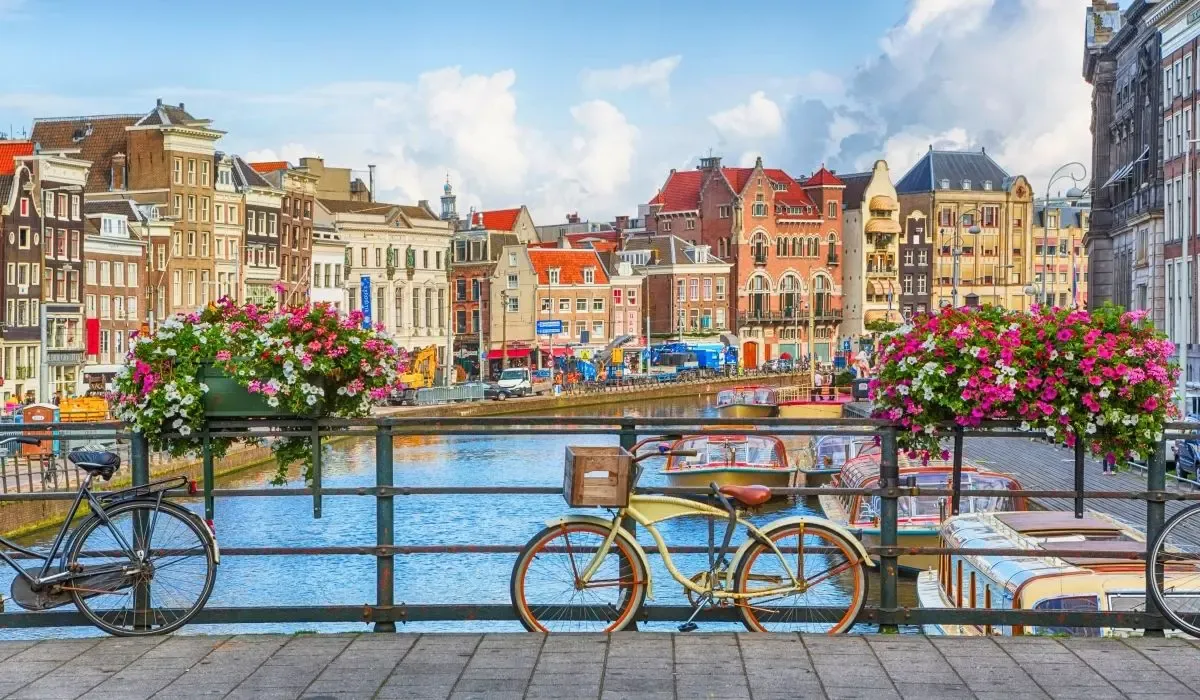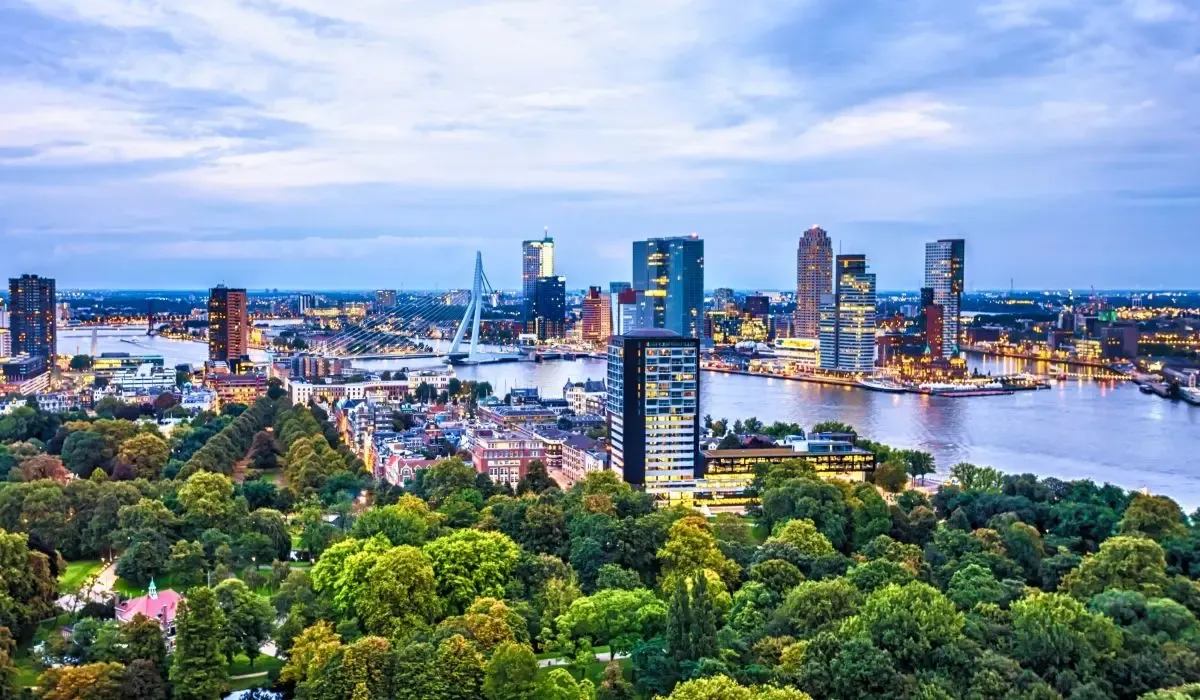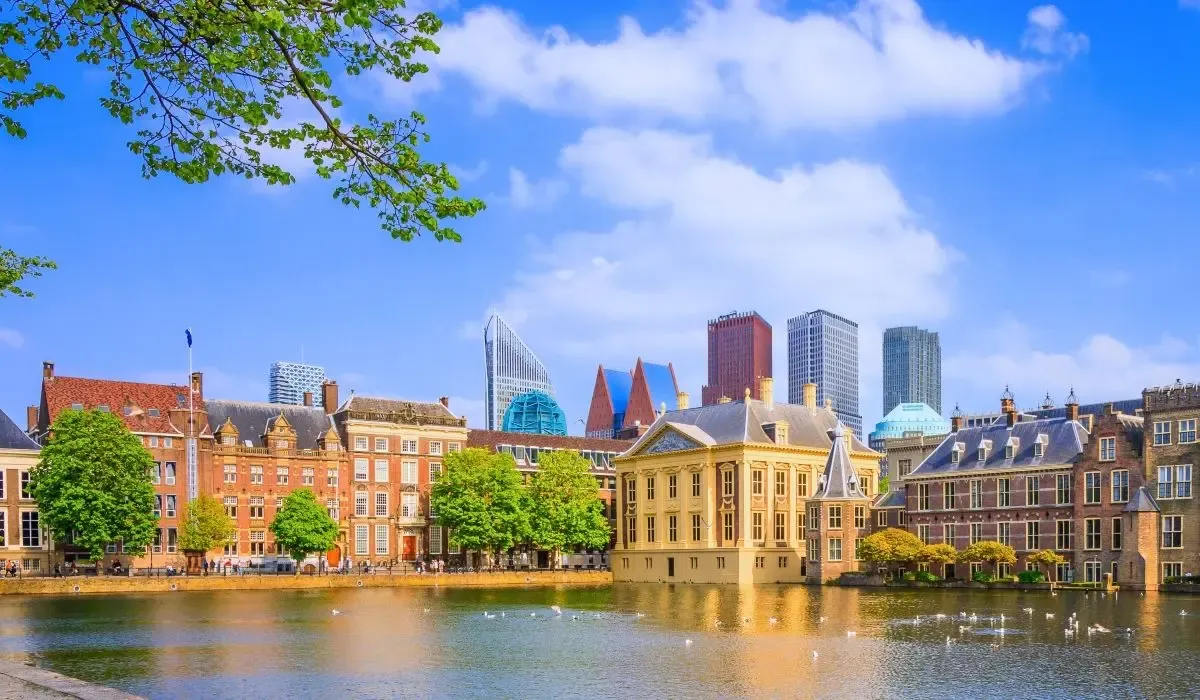Guide for Canadians Buying Property in the Netherlands
Buying property in the Netherlands from Canada? MTFX enables secure, cost-effective CAD to EUR transfers, helping you send large payments directly to Dutch notaries, legal representatives, or escrow accounts. Whether you're purchasing in Amsterdam or a historic canal town, MTFX offers better-than-bank exchange rates, faster settlement, and peace of mind for your overseas real estate transaction.
Nestled amidst Europe's captivating landscapes, the Netherlands stands out as a gem, boasting iconic windmills, vibrant tulip fields, and serene canals that weave through historic cities. For Canadians eyeing Europe to purchase property, buying a house in the Netherlands is a dream worth pursuing.
Whether envisioning a cozy canal-side apartment in Amsterdam or a quaint countryside retreat surrounded by tulip fields, the Netherlands offers endless possibilities for property ownership. For those planning to buy overseas property with competitive exchange rates, choosing the right foreign exchange partner is key to making the process more cost-effective and smooth.
In this guide explicitly tailored for Canadians, we will explore the complexities of the Dutch real estate market. From managing legal considerations to understanding local customs, we provide invaluable insights to empower prospective buyers to secure their piece of Dutch paradise.
Can a Canadian citizen buy property in the Netherlands?
Canadian citizens can buy property in the Netherlands, as there are no restrictions on foreign ownership of real estate. However, several important considerations and steps are needed before purchasing property in the Netherlands.
Legal requirements: Canadian citizens are subject to the same legal requirements as Dutch citizens when buying property in the Netherlands. This includes adhering to Dutch property laws, regulations, and procedures. It's advisable to seek legal advice from a Dutch lawyer specializing in real estate transactions to ensure compliance with local regulations and to better navigate the process to buy property in Europe.
Residence permit: While Canadian citizens do not need a residence permit to buy property in the Netherlands, they may require one if they plan to live there for an extended period. Residence permits are typically required for stays longer than 90 days. The rules regarding residence permits vary based on factors such as nationality, duration of stay, and purpose of residence.
Financing: Canadian citizens may have different financing options when purchasing property in the Netherlands. While some buyers may choose to finance the purchase with savings or obtain a mortgage in Canada, others may opt for financing from Dutch banks or lenders. Exploring all financing options and considering factors such as interest rates, terms, and repayment schedules is important.
Tax implications: Buying property in the Netherlands may have tax implications for Canadian citizens. This includes property taxes, income taxes on rental income (if applicable), and capital gains taxes on the sale of the property. It's advisable to consult with a tax advisor familiar with Canadian and Dutch tax laws to understand the potential tax liabilities and obligations associated with property ownership in the Netherlands.
Currency exchange: Canadian citizens will need to convert Canadian dollars to euros to purchase property in the Netherlands. It's important to consider currency exchange rates and fees when transferring funds internationally. Working with a reputable currency exchange provider can help minimize costs and ensure a smooth transfer of funds.
The benefits of owning property in the Netherlands
Owning property in the Netherlands offers numerous advantages, including potential access to the EU market and the country’s well-developed infrastructure. The Netherlands’ high quality of life, secure legal environment, and vibrant urban centers make it an attractive choice, with benefits spanning from financial stability and lifestyle improvements to the unique opportunity of immersing oneself in Dutch culture and community. For Canadians looking to buy property in Europe, the Netherlands stands out as a particularly compelling option.
Stable real estate market
The Dutch real estate market is known for its stability and resilience, making property ownership a secure, long-term investment option. The Netherlands’ steady economic growth and prudent housing policies help maintain property values, reassuring local and international buyers. For those considering buying a house in the Netherlands, this consistent stability makes the market highly attractive, offering solid returns even in uncertain times.
High rental yields
The demand for rental properties in popular cities like Amsterdam, Rotterdam, and The Hague remains high, offering the potential for excellent rental yields and steady income. This demand, driven by thriving job markets and a high influx of international students and expats, creates a consistent stream of tenants. For Canadians analyzing the Netherlands cost of living vs Canada, investing in Dutch rental properties can effectively supplement income and offset living expenses.
Strong legal protections
The Dutch legal system provides comprehensive protections for property owners, ensuring clearly defined property rights, transaction transparency, and reliable recourse in disputes. These strong legal protections make the Netherlands a secure choice for buyers, particularly international investors. Local and foreign property owners feel confident managing the real estate process with a system that guarantees fairness and clarity.
Access to EU residence
Owning property in the Netherlands may provide unique opportunities for Canadian citizens to obtain long-term residency or visa options within the European Union. This access facilitates more accessible travel and the chance to work, study, or explore business opportunities within the EU. Property ownership thus becomes more than an investment—it’s a gateway to the benefits of European living, culture, and market access.
Strong economy and infrastructure
With a stable economy and world-class infrastructure, the Netherlands offers property owners a supportive environment, including reliable utilities, efficient transport, and excellent health services. This extensive infrastructure supports urban and suburban lifestyles, raising the appeal of areas with cheap apartments for sale in the Netherlands. With advanced digital connectivity, these assets make the Netherlands a convenient and attractive property investment destination.
Cultural and social benefits
Owning property in the Netherlands allows individuals to fully engage with Dutch culture, enjoying the rich heritage, art, and culinary experiences. Beyond aesthetics, living locally provides the chance to connect with residents, fostering a sense of community and belonging. Property ownership thus becomes a gateway to building lasting relationships, experiencing daily life as a local, and truly understanding the Dutch way of life.

Best places to buy property in the Netherlands
The Netherlands offers a variety of charming cities and scenic regions where buying property can be an attractive option. Here are five of the best places to consider:
Amsterdam
As the Netherlands' capital city and cultural heart, Amsterdam is a vibrant and dynamic place to own property. Known for its picturesque canals, historic architecture, and world-class museums, Amsterdam offers a unique blend of culture, commerce, and cosmopolitan living. While property prices can be relatively high in central areas, there are opportunities to find more affordable options in the surrounding neighbourhoods for those considering buying an apartment in Amsterdam. Given its lively atmosphere and extensive amenities, this area remains highly appealing for investors and residents alike.
Utrecht
Located in the heart of the country, Utrecht is a bustling city with a rich history and a lively atmosphere. It boasts beautiful canals, charming streets, and a thriving arts and culture scene. Utrecht is also a major transportation hub, making travelling to other parts of the Netherlands and beyond easy. It enhances its appeal as a strategic and convenient home base for commuters and international travellers. Property prices in Utrecht are generally more affordable than in Amsterdam, making it an attractive option for buyers looking for value without sacrificing accessibility or cultural richness. Utrecht offers an excellent choice for those exploring property for sale in the Netherlands, with a balance of historical charm and modern amenities.
Rotterdam
Rotterdam is a modern and innovative city known for its striking architecture and bustling port. As one of the largest ports in Europe, Rotterdam offers a dynamic business environment and plenty of growth opportunities for professionals and entrepreneurs. The city's diverse neighbourhoods offer a range of property options, from waterfront apartments to historic townhouses, ensuring that every resident finds a community that matches their lifestyle, career needs, and personal preferences. With its contemporary vibe, Rotterdam is an ideal choice for those looking to buy a house in Holland and seeking a vibrant urban lifestyle. Buyers should also consider strategies to send money from Canada at competitive rates to manage the costs associated with property acquisition.
The Hague
The Hague stands as the political epicentre of the Netherlands, hosting the Dutch government and various international organizations. This prestigious and cosmopolitan city boasts a rich cultural heritage against the backdrop of beautiful parks, elegant boulevards, and a serene coastal ambiance, attracting expatriates and diplomats from around the world who appreciate its unique blend of global influence and local charm.
Haarlem
Located just west of Amsterdam, Haarlem is a charming and picturesque city known for its historic buildings, leafy streets, and vibrant shopping districts. It offers a laid-back lifestyle with easy access to the beaches of the North Sea and the beautiful Dutch countryside, creating an ideal balance for those seeking a quiet, community-focused setting that remains close to major urban centers for work and leisure. Property prices in Haarlem are generally lower than in Amsterdam, making it an appealing option for buyers looking for value amidst a peaceful and culturally rich setting.
Factors to consider when buying property in the Netherlands
When buying property in the Netherlands, it's crucial to consider several key factors to ensure a successful and rewarding investment.
Budget: Determine a clear budget and adhere to it strictly. Include the property's purchase price and additional expenses like taxes, maintenance, legal fees, and potential renovations. Keep an eye on the live exchange rate to understand how currency fluctuations could affect your final costs.
Property type: Choose a property type that suits your lifestyle and investment goals, considering options like apartments, houses, villas, or even commercial properties for rental income.
Legal considerations: Familiarize yourself with Dutch property laws, ensuring all permits and documentation are in order. Conduct due diligence to verify ownership and identify any legal encumbrances.
Financing options: Review financing choices available through savings, Dutch or Canadian bank mortgages, and lending institutions. Compare interest rates, loan terms, and repayment options carefully. Monitoring CAD to EUR exchange rate trends can help you decide the best time to secure funds for your purchase.
Tax implications: Understand the tax implications, including property taxes, rental income taxes (if applicable), and capital gains taxes on future sales, to avoid unexpected expenses.
Maintenance and renovation: Assess the property's condition, noting any necessary renovations or maintenance. Budget for these costs, including estimated timelines, to plan effectively for a smooth transition.
How to buy property in the Netherlands as a foreigner?
Here's a detailed guide on how Canadians can buy property in the Netherlands.
Step 1. Research and planning: Begin by thoroughly researching the Dutch property market. Consider factors such as property prices, location preferences, amenities, transportation links, and future development plans. Determine your budget, including the costs of buying a house in the Netherlands, and explore financing options, such as whether you'll need a mortgage. It’s also wise to understand how you’ll convert CAD to EUR for your purchase, as exchange rates can significantly impact your budget.
Step 2. Engage professionals: Seek assistance from professionals experienced in international real estate transactions. This includes hiring a reputable real estate agent who specializes in serving foreign buyers and a Dutch lawyer who can provide legal guidance throughout the process. Additionally, consider working with a currency exchange provider to facilitate international money transfers at favourable rates. This will be especially useful when exploring property for sale in the Netherlands or buying an apartment in Amsterdam.
Step 3. Property search and negotiation: Work closely with your real estate agent to identify potential properties that meet your criteria. Visit properties in person if possible, or utilize virtual tours to get a feel for the space. Once you've found a property you're interested in, whether buying a house in the Netherlands or a smaller residence, your agent will help you negotiate the purchase price and draft a preliminary sales agreement (compromis de vente) outlining the transaction terms.
Step 4. Legal, due diligence and financing: Conduct thorough legal and due diligence on the property with the assistance of your Dutch lawyer. This may involve verifying the property's ownership, checking for any outstanding debts or liens, and ensuring compliance with local zoning regulations. If you require financing, begin the mortgage application process and secure pre-approval from a Dutch lender.
Step 5. Completion and transfer: Once all legal and financial aspects are in order, proceed to the finalization of the sale. Sign the final sale deed (acte de vente) before a Dutch notary public, who will oversee the transaction and ensure its legality. Pay the purchase price, including any applicable taxes and fees, and register the property with the relevant authorities to complete the transfer of ownership.

Why do exchange rates matter when buying property in the Netherlands?
Exchange rates play a crucial role when buying property in the Netherlands, as the CAD/EUR rate fluctuations can significantly impact the overall cost. For Canadians, changes in the exchange rate directly affect purchasing power, which can increase or decrease the property price in Canadian dollars. When buying a house in the Netherlands, a favourable exchange rate can lead to substantial savings, while an unfavourable one can increase costs.
Additionally, currency exchange rates impact ongoing expenses, such as property maintenance and utilities, especially if you’re paying in euros. By monitoring exchange rates and timing currency conversions strategically, buyers can maximize their investment value and avoid paying more than necessary. Partnering with a currency exchange provider can also help secure better rates, adding to potential savings and providing peace of mind in the transaction.
MTFX: Your trusted international payments partner
Investing in buying property in the Netherlands for foreigners presents an exciting opportunity for Canadians, but it requires careful planning and informed decision-making. Canadians looking to purchase property, whether buying a house in the Netherlands or an investment property, benefit from understanding the local real estate market and assessing financial implications. Partnering with MTFX provides essential support throughout this process, with services designed to make international transactions smooth and cost-effective. MTFX offers competitive exchange rates, personalized guidance, and secure, streamlined payments explicitly tailored for Canadians, making property ownership in the Netherlands accessible and manageable.
Create your account today and take the first step toward seamless property ownership in the Netherlands!
FAQs
1. What currency is used for Dutch property transactions?
Euros (EUR) are the official currency for all property transactions in the Netherlands. MTFX facilitates seamless CAD to EUR transfers, ensuring funds arrive safely for real estate payments.
2. How do I transfer funds from Canada to the Netherlands?
You can use MTFX to convert CAD to EUR and securely send funds directly to a Dutch notary’s trust account. This ensures compliance and efficiency in completing property purchases abroad.
3. How long does a transfer to the Netherlands typically take?
Most MTFX transfers from Canada to the Netherlands are completed within 1–2 business days. Timing may vary slightly based on bank processing times and transaction size.
4. What documents do I need to transfer funds?
Typically, you’ll need a valid government-issued ID, the signed property purchase agreement, and the recipient’s banking details. These ensure regulatory compliance and safe money transfers.
5. Can I pay legal or notary fees via MTFX?
Absolutely. MTFX supports sending funds in EUR for all property-related expenses, including legal, notary, and administrative fees, making the process convenient and efficient.
6. Is it safe to send large payments internationally to the Netherlands?
MTFX uses advanced encryption, strict regulatory compliance, and full transaction tracking. This provides peace of mind when making large money transfers for property purchases.
7. What is today’s CAD to EUR exchange rate?
You can view live CAD to EUR rates on the MTFX platform or use the rate calculator for precise conversions. Checking rates helps you time your transfer for the best value.
8. Can I use MTFX for commercial or rental property payments?
Yes, MTFX can handle payments for residential, commercial, or rental properties in the Netherlands. The service is designed to accommodate all legal real estate transactions.
9. Can I repatriate funds to Canada if I sell my Dutch property?
Yes. MTFX can help you convert EUR sale proceeds into CAD and transfer them back to your Canadian bank account securely and efficiently, complying with financial regulations.
10. Are there capital controls or restrictions in the Netherlands?
No. As part of the EU, the Netherlands permits the free flow of capital. MTFX ensures all transactions comply with regulations, so your funds move without unnecessary delays.
Create your account today and take the first step toward seamless property ownership in the Netherlands!
Related Blogs
Stay ahead with fresh perspectives, expert tips, and inspiring stories.

Keep updated
Make informed decisions
Access tools to help you track, manage, and simplify your global payments.
Currency market updates
Track key currency movements and plan your transfers with confidence.
Create an account today
Start today, and let us take the hassle out of overseas transfers.



